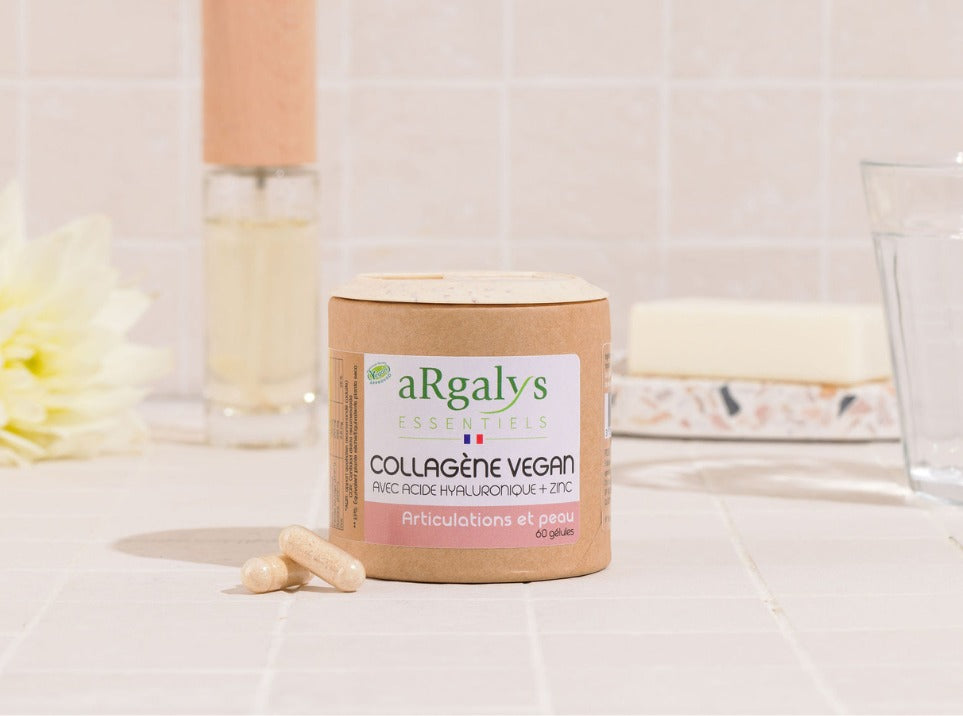Raw collagen, hydrolyzed collagen, vegan collagen? We take a look at them in this article!
With the growing demand for Collagen supplements, it is not easy to navigate all the forms and origins available on the market.
Here we explain the 3 existing solutions to stimulate the body's production of collagen with suitable food supplements.
What is collagen and what are its benefits?
Collagens are proteins that provide strength and firmness to the body's tissues. There are 28 variations, with type 1 representing 90% of the body's volume.
The adult human body contains approximately 3500 to 3800 grams of collagen, mainly located in bones, cartilage, muscles and skin.
The physical properties of collagen are due to its molecular structure made up of 3 intertwined strands connected by bridges which give it its strength and flexible resistance.
Collagen is the main agent of skin firmness and good cartilage maintenance.
The body naturally synthesizes collagen
The body naturally produces collagen , but this production gradually decreases with age, from around the age of 30.
It is the genetic code (DNA) that controls the complex mechanism of its synthesis.
Like all proteins, collagen is made up of “functional building blocks” called amino acids.
In adulthood, the body produces about 100 grams of collagen per day, when the amino acids Glycine and Proline, vitamin C and conventional crude protein are sufficiently available.
Collagen synthesis in the body goes through three crucial stages:
- Intestinal absorption of necessary nutrients,
- The constitution of the primary chains with a determining role of Glycine and Proline,
- Hydroxylation of proline and lysine after the formation of primary chains with the determining role of vitamin C
Like all physiological functions, this process gradually loses efficiency over time. It is accepted that collagen loss is around 1% per year from the end of growth. This corresponds to a loss of approximately 1 gram per day.
This loss of collagen will result in reduced skin elasticity and joint flexibility.
The particularities of Collagen protein
Collagen is distinguished by its unique molecular structure, composed of three intertwined strands linked by flexible bridges, mainly formed from hydroxylated amino acids such as hydroxyproline and hydroxylysine.
Each primary chain is an assembly of more than 1000 amino acids, including a high proportion of Glycine and Proline compared to other proteins, whether of plant or animal origin.
The bond between the primary strands determines the flexibility of collagen . It depends on two amino acids that have undergone a hydroxylation process (hydroxyproline, hydroxylysine) which absolutely requires a good availability of vitamin C.
The first type of supplement: Raw collagen
Raw collagen is obtained from the richest animal tissues: skins, bones, etc.
Crude collagen protein cannot be absorbed directly in the intestine because it is too large (Molecular Weight: 300,000 Daltons) to pass through the intestinal wall.
Raw collagen must be broken down into small fragments in the intestine before it can be absorbed and used by the body. This is the role of peptidase and protease enzymes, produced by the pancreas, which break down the primary molecule into peptides, which are groups of several amino acids.
Raw, unbroken collagen and oversized peptides are directly eliminated in the stool.
Raw Collagen as a food supplement:
- Pros: economical solution
- Cons: low bioavailability which requires large doses (more than 10 grams/day), it is always made from animal by-products.
Collagen peptide supplements (or hydrolyzed collagen)
These food supplements directly provide fragments of a Collagen protein: Peptides, which are associations of amino acids of variable size and composition.
This form has the advantage of being more easily assimilated.
In contrast, raw collagen is randomly broken down by digestive enzymes. Therefore, most of the resulting peptides are non-specific to collagen.
In direct supplementation, Professor Porsch's team (University of Kiel, Germany) demonstrated the effectiveness of daily intakes of 2.5 to 5 grams of hydrolyzed collagen, with visible results on skin firmness and hydration after 4 weeks of treatment.
Collagen Peptides as a food supplement:
- Pros: good bioavailability and supply of limiting amino acids
- Cons: Variability in peptide composition from one product to another. Products of animal origin.
Dietary supplements based on key amino acids including Glycine and Proline
The 3rd way to increase collagen synthesis is to directly provide the specific amino acids of collagen.
Collagen contains all types of amino acids except tryptophan.
However, 3 amino acids are present in much greater proportions than in other proteins: Glycine, Proline and Hydroxyproline.
The latter is a specific case linked to the presence of vitamin C which we will discuss next.
Comparative content of Proline and Glycine in % of crude protein from each source
|
Animal proteins (muscles) |
Vegetable Proteins |
Collagen |
|
|
Glycine |
2 to 5% |
1 to 3% |
18/25% |
|
Proline |
4 to 6% |
3 to 5% |
10/15% |
Among the amino acids, priority will be given to Glycine and Proline and, or its precursor Glutamic Acid, but also Lysine, Arginine and Alanine which are useful for the formation of Elastin which influences the elasticity of tissues.
Logically, the direct supply of these specific amino acids creates favorable conditions for the synthesis of collagen by the body.
A study published in 2022 by scientists from the Universities of Milan and Brescia [10] confirmed and measured the validity of this targeted strategy of supplementing key amino acids.
Their study concluded that a specific mixture of amino acids, 70% of which were Glycine, Proline, and Alanine, was more effective than hydrolyzed collagen in inducing extracellular matrix proteins, including collagens 1 and 4.
Specific Amino Acids as a food supplement:
- Pros: very good bioavailability, non-animal origin possible
- Cons: effective solution in addition to a satisfactory diet in raw proteins
Choose a formula that combines Collagen and Vitamin C
Whichever food supplement you choose, you must add vitamin C.
This vitamin is essential for the synthesis of Collagen through the hydroxylation transformation of proline and lysine.
The hydroxylation reaction consists of adding a pair of oxygen and hydrogen, denoted -OH, to molecules.
Hydroxyproline and hydroxylysine are derived from proline and lysine and provide the bonds between the primary strands and give collagen spirals their mechanical strength properties.
They are essential for the firmness of the skin and the maintenance of joint cartilage.
The hydroxylation reactions of Proline and Lysine absolutely require vitamin C. Without vitamin C: no collagen synthesis!
This explains why the symptoms of scurvy, a complete deficiency in vitamin C, correspond to a total cessation of collagen synthesis by the body and the degradation of all organic tissues.
In summary: the 3 types of food supplements useful for collagen synthesis
Partial compensation for collagen loss linked to aging is possible with targeted, daily nutritional intake.
Three approaches are therefore possible to increase the intake of key amino acids, but in all cases, vitamin C must be present at a satisfactory blood level.
We summarize them below:
|
Raw collagen |
Collagen peptides |
Key Amino Acids |
|
|
Origin |
Animal |
Animal |
No animal possible |
|
Molecular Weight |
300,000 daltons |
2000 da |
1000 da |
|
Bioavailability |
Low/Medium |
Good |
Very good |
|
Glycine + Proline content |
About 40% |
About 40% |
100% |
|
Effective daily dose |
From 10 grams |
From 2 grams |
From 200 mg |
|
Other conditions |
Presence of essential vitamin C |
||
A Pre-Collagen formula based on specific amino acids at Argalys
At Argalys, to complete our range, we have developed a formula for skin and joint health , without animal input.
This formula contains the ingredient Coll-Egan©, recognized by EFSA for its ability to promote collagen formation. Our Pre-Collagen supplement provides the essential amino acids for collagen synthesis, including glycine, proline, glutamic acid, and hydroxyproline, as well as vitamin C, which is essential for this process.
Our formula is certified vegan and is therefore suitable for all consumers.
Bibliographic:
- Hydrolyzed Collagen Induces an Anti-Inflammatory Response That Induces Proliferation of Skin Fibroblast and Keratinocytes - Maysa Alves Rodrigues Brandao-Rangel, et al.
- Three Decades of Research on Recombinant Collagens: Reinventing the Wheel or Developing New Biomedical Products - Andrezj Fertala, Department of Orthopedic Surgery, Sidney Kimmel Medical College, Thomas Jefferson University, Philadelphia, PA 19107, USA
- Absorption of hydroxyproline-containing peptides - Chinfang Liu, Kazuko Sugita, Ken-ichi Nihei, Koichi Yoneyama, Hideyuki Tanaka
- Type I hyperprolinemia: a study of the intestinal absorption of proline, hydroxyproline, and glycine - JP Farriaux, JL Dhondt
- Catabolism of Hydroxyproline in Vertebrates: Physiology, Evolution, Genetic Diseases and New siRNA Approach for Treatment - Ruth Belostotsky, Yaacov Frishberg
- Regulation of Peptidase Activity beyond the Active Site in Human Health and Disease - Ana Obaha and Marko Novinec
- Prolonged Collagen Peptide Supplementation and Resistance Exercise Training Affects Body Composition in Recreationally Active Men - Zdzieblik D, Oesser S, Baumstark MW, Gollhofer A, König D. Br J Nutr. 2015 Oct 28;114(8):1237-45.
- Oral supplementation of specific collagen peptides has beneficial effects on human skin physiology: a double-blind, placebo-controlled study - Proksch E, Segger D, Degwert J, Schunck M, Zague V, Oesser S. Skin Pharmacol Physiol.
- Control analysis of collagen synthesis by glycine, proline and lysine in bovine chondrocytes in vitro – its relevance for medicine and nutrition - Patricia de Paz Lugo & al.
- A designer mixture of six amino acids promotes the extracellular matrix gene expression in cultured human fibroblasts" - Laura Tedesco, Fabio Rossi, Chiara Ruocco & Al. Center for Study and Research on Obesity, Department of Medical Biotechnology and Translational Medicine, University of Milan- Italy; and Department of Molecular and Translational Medicine, Brescia University - Italy.
 04 74 03 98 80
04 74 03 98 80









